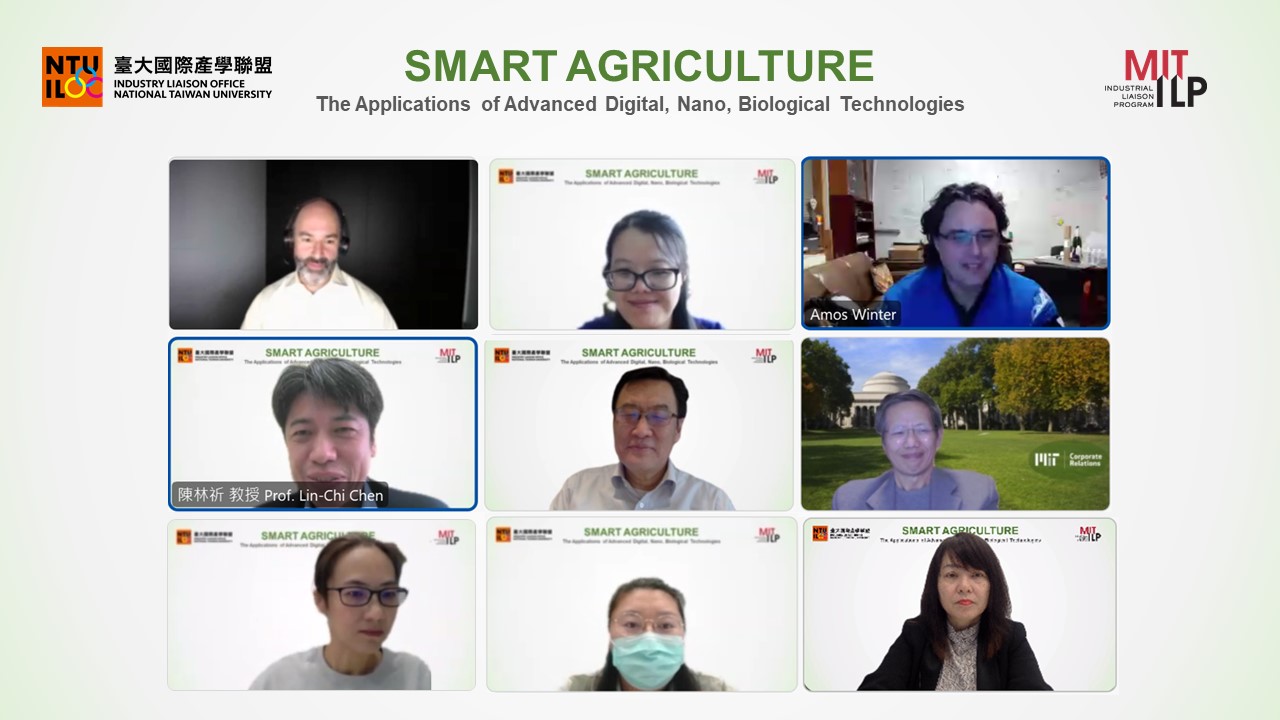Due to the change in climate, manpower structure, food demand, and other factors, every agricultural-producing country has been applying smart technologies to farming, including sensors, robotics, IoT, data integration and analysis, in an attempt to provide solutions to increase the quantity and quality of products and maximize the resource efficiency. Industry Liaison Office, National Taiwan University held an online workshop “Smart Agriculture: The Applications of Advanced Digital, Nano and Biological Technologies” on December 15 and invited experts from National Taiwan University and the Massachusetts Institute of Technology to present their research results and exchange communications. Professor Pai-Chi Li, VP of Office of Research and Development, and Director of Industry Liaison Office, NTU said in his opening speech, “Based on a more precise and efficient approach, smart farming is expected to be the future of agriculture. Today we have professors from different disciplines including chemical, mechanical, and biomechatronics engineering. In their talks, they will show us how we can put modern technologies to practical use and build a more productive and sustainable agricultural industry from different perspectives.”

Photo 1: Group photo of workshop speakers and guests
The workshop opened with Michael S. Strano, Carbon P. Dubbs Professor in Chemical Engineering, MIT. Professor Strano talked about the sustainable technology of precision agriculture. In response to the increasing population and decreasing farmland, urban agriculture has become an important development of food production. His research team focuses on developing nano and optical sensors to measure plant metabolites in real-time and study the production of plant hormones and secondary metabolites to improve urban farming, and develop disruptive technologies for discovering plant biosynthetic pathways. Next, Amos Winter, Ratan N. Tata Assoc. Professor in Mechanical Engineering, MIT talked about his research on low-energy, renewable-powered, low-cost smart irrigation and desalination. Take India as an example, due to the scarcity of fresh, potable groundwater and the unreliability of the electric grid in many parts of the area, Professor Winter’s team is developing solar energy-powered, low-cost and low-power drip irrigation systems which deliver water through a piping network that release the water directly to the base of the crops, reducing water consumption by 20~60% compared to conventional irrigation. As irrigation accounts for over 70% of freshwater use, large-scale adoption of drip irrigation would reduce the consumption of freshwater. It not only would assist agricultural development, but also ensure a sufficient supply of fresh water.
In the second half of the workshop, Shih-Fang Chen, Associate Professor of the Department of Biomechatronics Engineering and Chief of the Research Section, Center for Intelligent Agriculture, NTU talked about how to utilize artificial intelligence in agriculture. Professor Chen's research goal is to use modern technology to replace intense labor with automation, and to learn expert experience with artificial intelligence. She uses tea as the research subject, covering topics from the image-based tea leaf monitoring system, spectral image monitoring of large fields for harvest prediction, development of plant disease identification and prescription suggestion system, and tea grading system. It helps farmers achieve early detection and early treatment, reduce losses and improve quality in the whole process. Next, Lin-Chi Chen, Deputy Vice President for Academic Affairs and Professor of the Department of Biomechatronics Engineering, NTU talked about connecting electrochemical sensor chips to AI and IoT for smart agriculture. Using the concept of electrochemistry, Professor Chen connects information with chemical signals or biological signals and applies ion sensors in hydroponics or soil farming to provide chemical information that cannot be seen by the naked eye for more precise plant nutrition management and achieve precision agriculture. Professor Chen's research team overcame the previous challenges of large and costly ion sensors, successfully integrated information with mobile phones, and developed a “Smart Multiplex Ion Detection” system. Professor Chen also introduced a smart nutrient solution monitoring system “Multiplex Ion Sensor IoT for PFs”, which can be applied to plant factories and also to fields with large changes in natural sunlight temperature and humidity. It can monitor the change of nutrient solution ions, creating various potentials for future agriculture.
Professor Lin-chi Chen, who is also the moderator of the workshop, concluded the event with the following remarks. The two MIT professors, from the perspective of the global agriculture industry, proposed solutions to meet food demand from two aspects: precision agriculture and low water and energy consumption. The two professors from NTU combined biomechanical, artificial intelligence and the Internet of Things to provide smart agricultural technology that reduces manpower and costs, and improves yield and quality with technologies such as image interpretation, machine learning, and sensors. This workshop demonstrated the importance of interdisciplinary research in solving world problems. In the face of the potential food shortage in the world, only the integration of advanced technologies from various fields can bring more development possibilities for smart and precision agriculture.